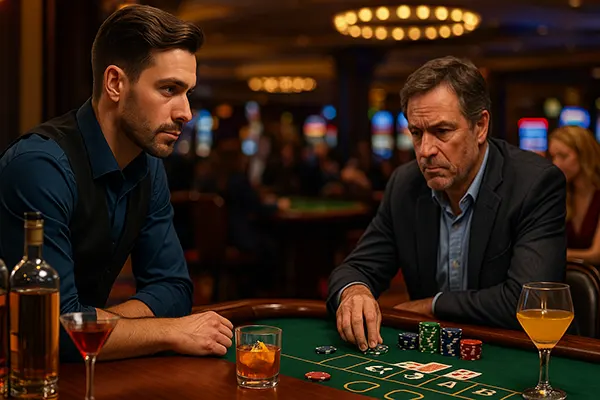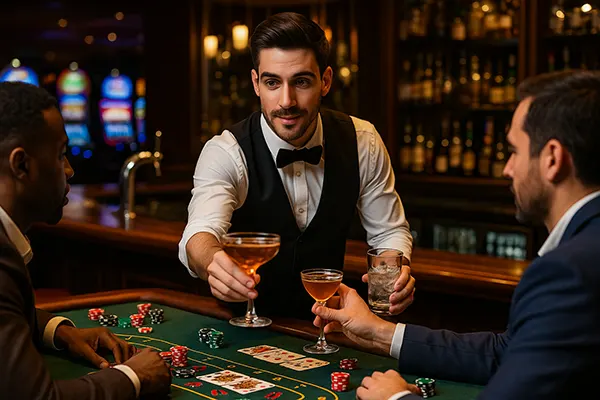
Psychology of the Bartender: How Mixologists Read Players’ Emotions at the Gaming Table
In modern casinos, bartenders have evolved beyond the role of drink servers. They have become emotional interpreters, mediators between excitement and restraint. Their understanding of psychology allows them to read the room, assess players’ moods, and subtly influence the casino’s social balance. This psychological awareness has turned the art of mixology into an emotional science that complements the gaming experience.
The Emotional Intelligence Behind the Bar
Emotional intelligence has become a fundamental skill for casino bartenders in 2025. They are trained to observe body language, tone, and expression to gauge how players feel. When a guest becomes anxious or restless after a losing streak, a bartender’s calm presence and gentle conversation can help restore emotional equilibrium.
Casinos worldwide have started incorporating psychology-based hospitality courses into staff education programmes. In Denmark, the United Kingdom, and Monaco, employees learn to recognise stress indicators and apply verbal and nonverbal empathy techniques. These measures have significantly improved guest satisfaction and reduced behavioural incidents at gaming tables.
In this context, the bartender is not only a service professional but also a silent guardian of responsible gambling. Their interventions — from a timely offer of water to a brief chat — can prevent impulsive decisions driven by heightened emotions or fatigue.
Observing the Subtleties of Human Behaviour
Professional mixologists are trained to identify subtle shifts in body language. A player’s change in posture, a forced smile, or an unusual order may signal emotional imbalance. These small cues enable bartenders to adapt their tone and interaction style, ensuring that guests feel understood rather than judged.
Psychologists working with casino staff highlight that empathy-driven communication builds loyalty. Regular players often confide in bartenders more easily than in floor managers or dealers, viewing them as neutral and approachable figures. Through these informal exchanges, bartenders gain a deeper understanding of gambling psychology and human motivation.
By recognising the patterns behind player behaviour — whether excitement after a win or frustration following a loss — bartenders can subtly guide conversations away from tension and towards positive engagement, supporting both the guest’s well-being and the casino’s harmonious environment.
The Connection Between Drinks and Emotions
In 2025, the science of mixology has become intertwined with neuroscience. Bartenders study how certain flavours and alcohol types influence mood and behaviour. For instance, drinks with citrus or herbal notes tend to refresh and calm, while those rich in sugar or caffeine may heighten excitement. Understanding this connection allows bartenders to craft beverages that stabilise emotions rather than amplify risk-taking impulses.
Responsible casinos now promote “balanced mixology” — a trend that focuses on moderation, hydration, and alcohol-free options. Bartenders are trained to notice when guests exceed their limits and to suggest alternatives, such as mocktails or low-ABV cocktails. This approach aligns with global responsible gambling initiatives.
According to the European Casino Association, more than 40% of casinos have introduced wellness-oriented menus. These menus include drinks that support focus and relaxation, helping guests sustain concentration during long gaming sessions. This subtle shift demonstrates how hospitality can enhance safety without diminishing pleasure.
Crafting Drinks for Mental Balance
Modern mixologists often collaborate with nutritionists and psychologists to design cocktails that support emotional regulation. Ingredients like lavender, ginger, and citrus oils are used for their natural stress-reducing properties. The aim is to offer drinks that enhance comfort while maintaining cognitive clarity.
Casinos in Las Vegas and London have even adopted “mindful mixology” programmes. These initiatives teach bartenders how to recommend drinks based on emotional cues — such as suggesting a light herbal spritz to a tense player instead of a strong spirit. The focus is no longer on consumption volume but on emotional alignment.
This evolving trend illustrates how the bartender’s role has expanded into psychological stewardship. They help maintain a balanced emotional climate on the gaming floor — a task that benefits both the player’s mental well-being and the casino’s reputation for responsibility.

Modern Training and the Future of Casino Mixology
By 2025, the professional training of bartenders has become deeply interdisciplinary. Hospitality schools now combine psychology, behavioural science, and communication courses with practical bar skills. The aim is to create specialists who understand not only flavours and techniques but also the emotional architecture of entertainment spaces.
Artificial intelligence tools are increasingly used to support this training. AI-assisted observation systems can analyse guest behaviour patterns and provide feedback to bartenders about emotional responses, helping them refine their interpersonal approach in real time. These technologies, however, are always complemented by human intuition — something no algorithm can replace.
As gaming environments become more sophisticated, the psychological literacy of bartenders will continue to evolve. Their ability to read emotions and foster empathy will remain essential for building trust, promoting responsible gaming, and preserving the social harmony that defines the modern casino experience.
The Ethical Side of Emotional Awareness
While psychological insight enhances hospitality, it also requires ethical sensitivity. Bartenders must balance empathy with discretion, ensuring that personal observations are never exploited or shared beyond their professional boundaries. Respecting guests’ privacy is a fundamental aspect of trust within casino culture.
Leading hospitality associations have introduced ethical codes outlining how staff should apply behavioural insights responsibly. These frameworks emphasise consent, confidentiality, and the importance of maintaining neutrality in emotionally charged environments. Training now includes modules on ethics and emotional boundaries.
The future of casino bartending therefore lies at the intersection of skill, psychology, and integrity. The mixologist of 2025 is not just a craftsman but a quiet observer of human nature — blending empathy and precision to create an environment where entertainment and emotional well-being coexist.
